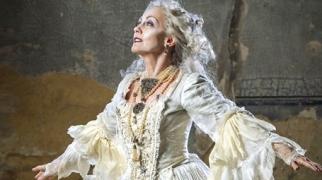Great Expectations - Review
By the time Charles Dickens got round to writing 'Great Expectations', he had already penned his way through a dozen other novels. So he was already a master craftsman in the writing department with the creative genius to conceive hugely compelling stories and conjure-up extraordinary characters that jump out of the page. 'Great Expectations' first appeared in serial form in the latter part of 1860, and through to the end of the summer of 1861. Apparently, it was going to be twice as long, but the publishers kept the length in check. The adaptor here, Jo Clifford, must have been thankful for that fact, even if it must still have been a hugely daunting task reducing this well-known and much-loved novel to a play of just about 140 minutes.
Dickens' novel is set in Kent and London, and the main location most of us remember is Miss Havisham's house where everything is covered in cobwebs and we find the remains of a wedding which never happened. This is the place where all of the action is set in this production, which is directed by Graham McLaren. Robin People's set is impressively detailed and evocative. As one might imagine, cobwebs and dust are particularly dominant (even the costumes have cobwebs, too), and there are gaping holes in the walls which have fallen into disrepair. The problem, though, is that the house has to stand duty for locations in other parts of the story which are not set in Miss Havisham's home. Much then has to be left to our imagination. Most of the time, that works pretty well, though a scene where umbrellas are used to describe the river does not work so effectively. However, there are scenes where characters thrust their heads though the yawning holes in the walls, and where figures appear in the large mirror above the fireplace.
The story is about an orphan boy called Pip who lives with a kindly, warm-hearted blacksmith called Joe Gargery, and his rather bad-tempered wife. One day Pip stumbles upon an escaped convict called Magwitch and provides him with some food and a file. Later, Pip is asked to visit the home of Miss Havisham to be a kind of companion to Estella, Miss Havisham's adopted daughter. Then a lawyer called Jaggers informs Pip that he has been provided with substantial funds by an un-named benefactor, and he is to go and live in London as a gentleman.
Pip is played here by two actors. Paul Nivison is an older Pip, who acts as a kind of narrator as we see past events in his life. In these flashback sequences, a younger Pip is played by Taylor Jay-Davies who is highly convincing as both Pip as a boy, and also when he is later in London as a young adult. Chris Ellison provides a rather nasty, almost terrifying Magwitch, and Paula Wilcox is the forlorn Miss Havisham who still wears her tattered bridal dress years after her husband-to-be deserted her.
Though some of the larger-than-life characters provide opportunities for humour, 'Great Expectations' is not exactly fun. It is often poignant and rather sad, if not a little depressing at times. But that is what makes this a compelling story, and the audience seemed hypnotically engrossed by the story and this meticulously-directed and worthy adaptation. I had reservations about the setting for the first half an hour or so, but those quickly passed and I found the second half, in particular, totally absorbing too.
"A striking piece of theatre...It's an inventive production, but one that sells Dickens's great novel dismayingly short. "
Charles Spencer for The Daily Telegraph
"This is a plodding show."
Henry Hitchings for The Evening Standard
"Bold but crudely executed new vision of the material.
Paul Taylor for The Independent
"There's no denying the inventiveness of the piece but while the production has the power to draw you in to Dickens's always gripping plot it's a little like overdosing on melodrama." Julie Carpenter for The Daily Express
Originally published on
